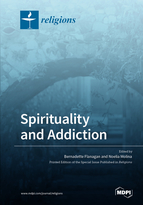Spirituality and Addiction
A special issue of Religions (ISSN 2077-1444). This special issue belongs to the section "Religions and Health/Psychology/Social Sciences".
Deadline for manuscript submissions: closed (31 July 2021) | Viewed by 34392
Special Issue Editors
Interests: spiritual education; spiritual care; spiritual practice; spirituality in dialogue with healthcare, education, aging, addiction, leadership; Contemplative traditions
Interests: psychospiritual maps; spiritual intelligence; spiritual awakening; counselling and spirituality; motherhood and spirituality; spiritual autobiography; soul–friendship
Special Issue Information
Dear Colleagues,
This issue will include articles and reviews which discuss the longstanding recognition of diverse connections between spirituality and addiction and emerging discussions regarding the spiritual dimensions of addiction treatments. The overall focus will be on the overlaps between the journey into addiction and the spiritual journey, informed by the insight of Carl Jung that addictive craving and the seeking of ultimate meaning may be intimately connected. The multiplicity of forms which addiction can assume in contemporary society will be the scope of the issue.
This issue is intended to advance insight into such issues as:
- Textual or ethnographic analysis of historical contributors to the discussion such as Carl Jung; William Griffth Wilson; Robert Holbrook Smith; Bridget Della Mary Gavin (Sister Mary Ignatia); Gerald May; Eileen Fitzgerald (Sr Consilio);
- Spiritual aspects of addiction to hurry;
- Spiritual recovery programmes for alcohol addiction;
- Spiritual interventions for gambling addiction;
- Religious, spiritual, and psychological aspects of exercise addiction;
- Sex addiction and spiritual seeking;
- Ancient spiritual insights to addictions, including the logismoi, deadly sins traditions;
- Overlaps between neurological and spiritual aspects of Internet browsing addiction;
- Conversion therapies and shopping addiction;
- Religious, spiritual, and psychological aspects of pornography addiction;
- Inter-spiritual perspectives on drug addiction;
- Monastic “ora et labore” implications for work addiction;
- Addiction to the spiritual experience—ayahuasca and other entheogens;
- Food addictions and the spiritual quest in a historical perspective;
- Social media addiction and spiritual authenticity;
- Hooked on smokes: how to build a spiritual response;
- Prescription drug addiction and spiritual wounds;
- Fashion addiction: clothing the soul;
- Spiritual bypassing and addiction;
- Impulsivity, compulsivity, and spirituality;
- Recovery spiritualities;
- Soul wounds and addiction;
- Effective spiritual practices for engaging addiction.
The overall purpose of the Special Issue will be to extend the range of manifestations of addiction which discuss matters relating to the soul of recovery. Through this extended agenda of forms of addiction, the issue will usefully supplement existing literature on the subject of spirituality and addiction.
Dr. Bernadette Flanagan
Dr. Noelia Molina
Guest Editors
Manuscript Submission Information
Manuscripts should be submitted online at www.mdpi.com by registering and logging in to this website. Once you are registered, click here to go to the submission form. Manuscripts can be submitted until the deadline. All papers will be peer-reviewed. Accepted papers will be published continuously in the journal (as soon as accepted) and will be listed together on the special issue website. Research articles, review articles as well as short communications are invited. For planned papers, a title and short abstract (about 100 words) can be sent to the Editorial Office for announcement on this website.
Submitted manuscripts should not have been published previously, nor be under consideration for publication elsewhere (except conference proceedings papers). All manuscripts are thoroughly refereed through a double-blind peer-review process. A guide for authors and other relevant information for submission of manuscripts is available on the Instructions for Authors page. Religions is an international peer-reviewed open access monthly journal published by MDPI.
Please visit the Instructions for Authors page before submitting a manuscript. Submitted papers should be well formatted and use good English. Authors may use MDPI's English editing service prior to publication or during author revisions.
Keywords
- addictions
- soul care
- applied spiritualities
- spiritual practices
- measuring spiritual wellbeing in addiction programmes
- faith-based
- inter-spirituality
- addiction recovery







